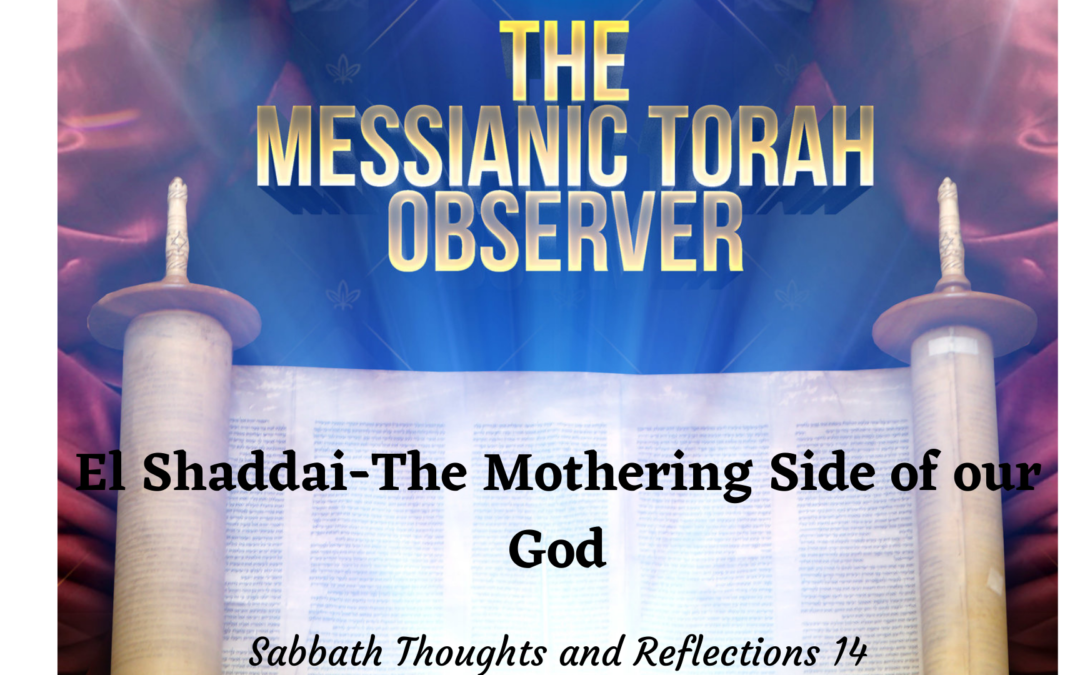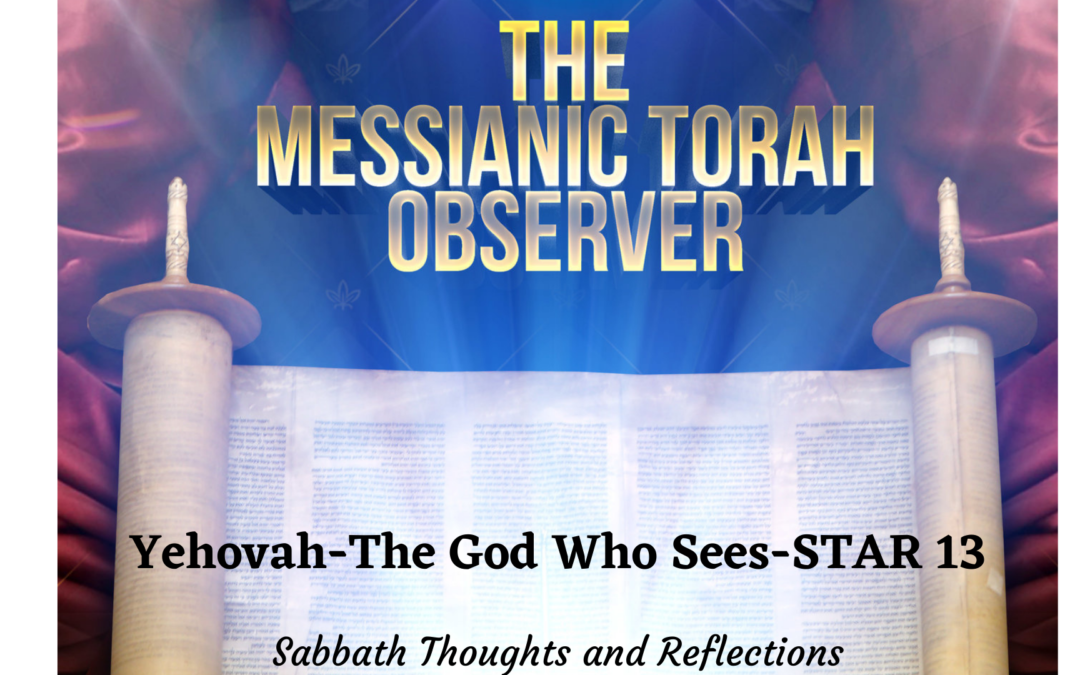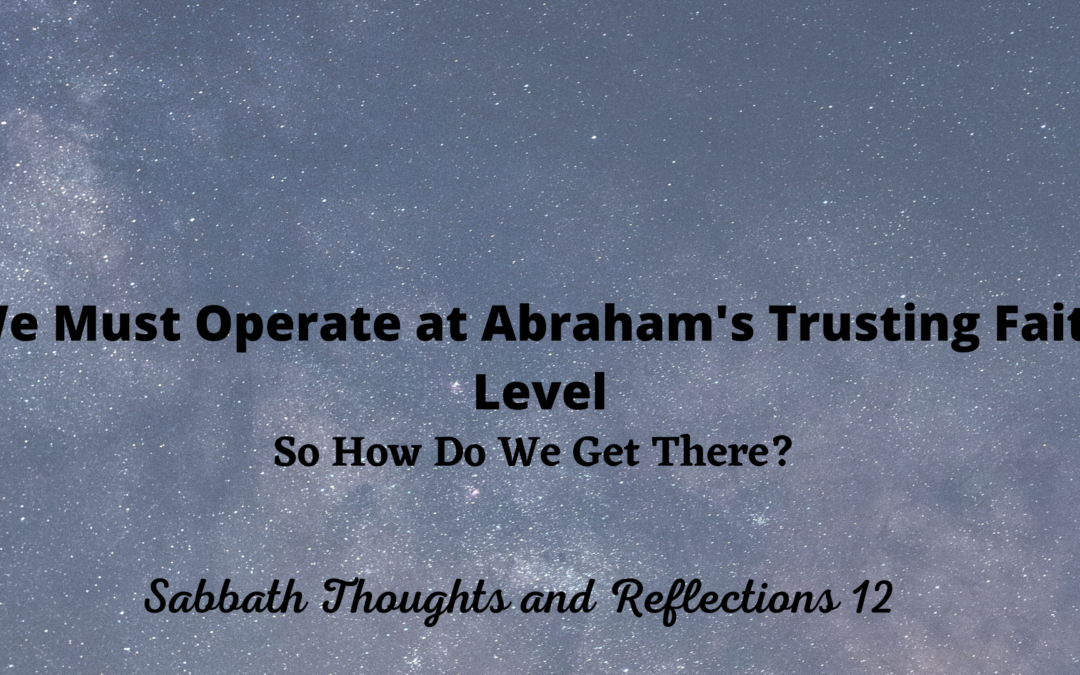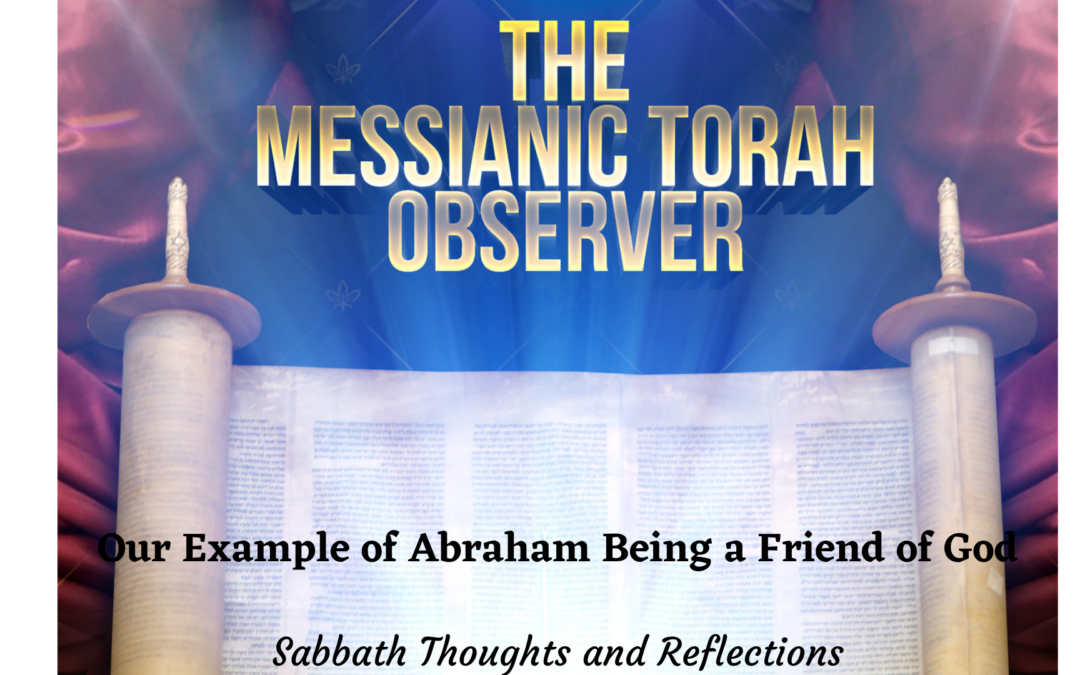This week’s Torah Reading is about the Holiness Codes that Father provided to the Hebrews in order that they be set-apart from the nations of the world. These holiness codes remain in effect for every disciple of Yeshua and are of salvific expediency.
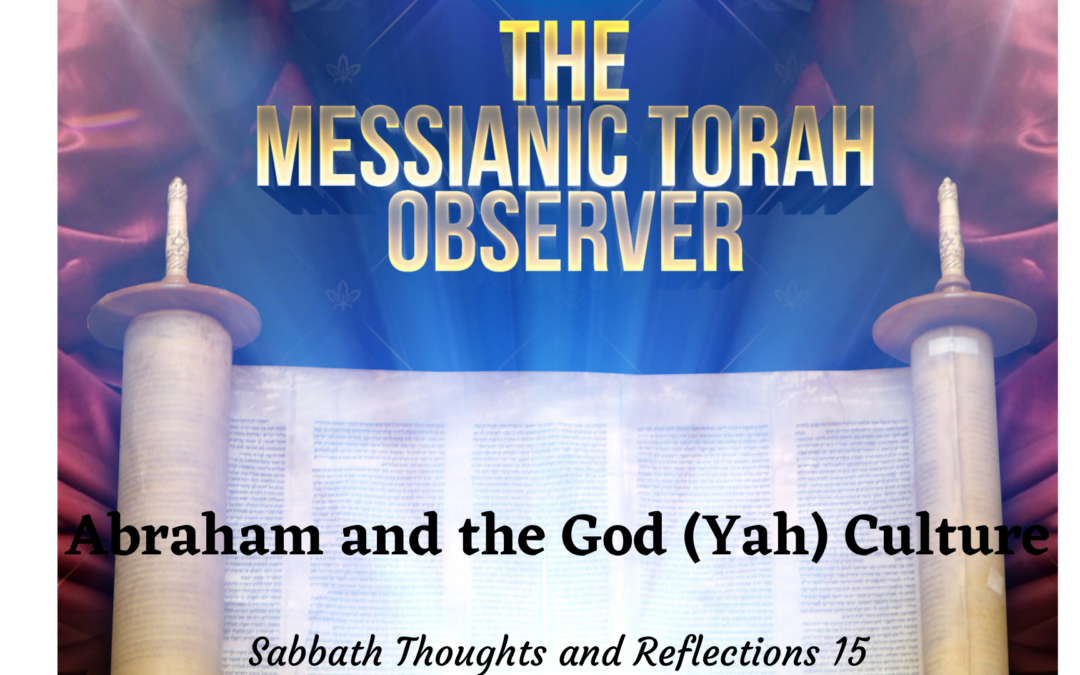
Abraham and the God (Yah) Culture–Sabbath Thoughts & Reflections 15
This week’s Torah Reading Discussion is the 15th Parshah (aka Torah Portion) of the 3-year Torah Reading Cycle. It is contained in the 18th chapter of Genesis, verses 1 through 33.
I’ve been led to title this discussion “Abraham and the God—the Yah Culture.” And despite there being no mention of culture in the text whatsoever, I trust that by the end of our discussion here today, you will understand what I mean by culture; where culture comes into our reading; how culture plays into the overall storyline contained in our reading; and the relevance of that culture to you and me.
Because this story is made up of so many rich pieces, I’ve made the bold decision/crazy decision to cover the entire 33-verses of this reading.
As in times past, I will be using the Robert Altar Translation of the Torah, that is entitled: “The Five Books of Moses.” I will also be drawing commentary from a number of sources that I will cite accordingly.
18:1. And the LORD appeared to him (Avraham) in the Terebinths of Mamre when he was sitting by the tent flap in the heat of the day.
18:2. And he raised his eyes and saw, and, look, three men were standing before him. He saw, and he ran toward them from the tent flap and bowed to the ground.
Seems general rabbinic thinking has this specific event taking place immediately after the events from last chapter/reading/parshah. We covered only the first 2-verses of chapter 17 in our discussion on that reading, and so we didn’t get into the other elements of the story. But the primary element of that parshah was the institution of physical circumcision to serve as a token of the overall Avrahamic Covenant.
The rabbis, in their ever evolving imagination, deduced that here in this verse, Avraham is sitting by the flap of his tent, suffering through the aftermath of his freshly performed circumcision. And the thinking that comes from this situation is the moral duty of visiting the sick.
Messianic Torah Teacher, author and commentator Tim Hegg brings up the rabbinic thinking that this reading is about, in part, the visiting of the sick and hospitality to the stranger.” But in this particular case, it is Yehovah who is visiting his sick friend, Avraham. How is Avraham considered infirmed or ill? Because the rabbis link the events of this Torah reading passage with those of the last reading, chapter 17. The tail end of that passage records Avraham having his entire household, including himself circumcised. The rabbis contend that this reading chapter 18 is just 3 or so days after Avraham is circumcised.
The rabbis are quick to point out that despite Avraham’s infirmed state, being in such pain, he makes great effort to show his guests the most hospitality possible.
The truth of the matter is that there is no way of telling for sure whether the events of this reading occur on the heels of the events of last week’s events. To make such a claim is rather presumptive, although Jasher, an extra-biblical, historical book, straightway says that the events of this reading takes place 3-days after Avraham was circumcised.
Jasher (chapter 18) connects with our Torah Reading by describing Avraham sitting just outside his tent, enjoying the heat of the sun, 3-days after his circumcision.
Competing Viewpoints on the Manifestation of Yehovah to Abraham The Theophany Explanation
Many Messianics believe these 2 verses fall within the category of what is known as a theophany. And I’ll explain what a theophany is in just a moment. But Messianic teachers and commentators such as Tim Hegg contend that Yehovah, who is one and the same person as Yeshua Messiah, in a preincarnate state, was one of the 3 men visiting Avraham here in our reading discussion.
I cannot support the belief that one of these 3 men was the incarnate Yeshua Messiah, as Tim Hegg so strongly asserts in his commentary on this passage. This understanding of such appearances throughout scripture falls under the general concept of a “theophany.” Essentially, a theophany is a visible manifestation of God, in denominationalism in particular, of the pre-incarnate Jesus Christ, to humans.
This whole thinking of theophanies presumes a great many things as it relates to Yehovah’s methods and for intervening into the affairs of His human creation. In evangelical denominationalism, it presumes that Yehovah and Yeshua are one and the same Person, while in other Judeo-Christian circles, it presumes that Yehovah manifested Himself to people in human form from time-to-time.
Now, I personally do not hold to the belief that Yeshua and Yehovah are one and the same person. I’ve touched upon this issue a number of times during my tenure here on this platform. And for today, I am not inclined to get into such a highly charged topic. If you are interested in hearing or reading of my understanding of the Persons of Yehovah and Yeshua, I invite you to visit https://themessianictorahobserver.org, type in the search bar the “the divinity of Christ,” and you’ll find a listing of posts that I did on the subject.
If we were to set aside this being a manifestation of the preincarnate Jesus Christ for now, and just focus on this being Father Yah manifesting Himself in human form before Avraham, we would have to overcome a couple sticky passages that state:
“No man hath seen God at any time…” (1 Joh. 4:12a; KJV).
Yah tells Moshe when He petitioned Abba to see Him face-to-face:
“You cannot see My face, for no man can see Me and live” (Exo. 33:20; KJV).
But Hegg overcomes the problem passage where that declares no one has seen Yehovah at any time and lived to tell about it, by asserting that this understanding does not apply when Yah manifests Himself in human form. And to some extent, I’m able to follow him on that. He contends that we have to let scripture say what it says, without inserting our own concepts into it. And that is also true.
But as far as I’m concerned, the text leaves in its wake a number of unanswered questions. The wording and phrasing is a bit shaky, let’s say. For the first verse states simply that Yehovah appeared to Avraham in the terebinth of Mamre. And then in the very next verse, it states that Avraham lifted up his eyes and saw 3-men approaching him.
How did Yah appear to Avraham? In what form? The text is not clear. And for me, we have one of 2 reasonable paradigms to fall on: (1) Yehovah did actually manifest Himself to Avraham in a vision; or (2) Yehovah was represented by one of His messengers. I’m on the fence, but I’m inclined to go one of the men being Yah’s direct representative to Avraham. The problem with the vision thing is that the text does not mention a vision at all, unlike Genesis 15 where it says that YHVH came unto Abram in a vision (vs. 1). If verse 1 describes a vision, why wouldn’t Moshe state that Yah appeared to Avraham, again in a vision. Just saying.
I would go so far as to suggest that Yah used the angel that spoke on His behalf in previous visitations to the patriarch. The reason I believe this to be true is because it appears that Avraham recognized at least one of them men, as the text states:
“…three men were standing before him. He saw, and he ran toward them from the tent flap and bowed to the ground” (18:2).
If Avraham did not recognize at least one of these messengers, what would compel him to run up to these men and bow down or worship them? No level of hospitality of lowly souls required the ANE person to worship prior to providing them refreshments.
18:3. And he said, “My lord, if I have found favor in your eyes, please do not go on past your servant.
Here’s another interesting rabbinic tidbit to chew on in regard to this verse. There is this thinking that these 3-men or angels each came with a specific assignment, for angels are given just one assignment. They could not possibly be given 2 or 3. Just one.
Well, here we find, according to the rabbis, that the first angel is given the duty of announcing to Avraham and Sarai the pending birth of Yitzchak. The second angel’s assignment was to destroy the cities of the plain, in particular, the city of Sodom. And the third angel’s assignment was to rescue Lot.
18:4. Let a little water be fetched and bathe your feet and stretch out under the tree,
18:5. And let me fetch a morsel of bread, and refresh yourselves. Then you may go on, for have you not come by your servant?”
Avraham’s hospitality cannot escape our mention here. Such hospitality was not uncommon in the ANE. And as our story progresses, we will see somewhat of a contrasting persona, as Avraham boldly attempts to bargain for lives in doomed Sodom.
The thing of interest here, at least for me, is that Abraham, in his hospitality, promises his guests modest refreshments, but as the story progresses, he over delivers on the promised refreshments by delivering a feast.
From a rabbinic standpoint, such hospitality is the mark of a good man. Such hospitality demands that the host perform more than he promises. And so, here we have Avraham intentionally diminishes the spread he would provide his guests, and then we find in the next 3-verses that he provides them his best.
18:6. And they said, “Do as you have spoken.” And Abraham hurried to the tent to Sarah and he said, “Hurry! Knead three seahs of choice semonlina flour and make loaves.”
18:7. And to the herd Abraham ran and fetched a tender and goodly calf and gave it to the lad, who hurried to prepare it.
Rabbinic sources are split as to who this lad may be. One source I consulted contends that the lad was Eliezer of Dammasek, Avraham’s head servant and before Ishma’el, presumed heir of his estate. Another source suggests that this lad was none other than Ishma’el.
18:8. And he fetched curds and milk and the calf that had been prepared and he set these before them, he standing over them under the tree, and they ate.
18:9. And they said to him, “Where is Sarah your wife?” And he (Avraham) said, “There, in the tent.”
18:10. And he (one of the men) said, “I will surely return to you at this very season and, look, a son shall Sarah your wife have,” and Sarah was listening at the tent flap, which was behind him.
One of the men-angels states to Avraham, and to Sarah who seems to have been eavesdropping into the men’s conversation, that that time next year, he would return to him and Sarah would bare Avraham a son.
18:11. And Abraham and Sarah were old, advanced in years, Sarah no longer had her woman’s flow.
18:12. And Sarah laughed inwardly, saying, “After being shriveled, shall I have pleasure, and my husband is old?”
Sarah’s laughing was not the same as Avraham’s previous laugh. Sarah’s laugh was incredulous (disbelief) at the prophetic announcement that she would bare a son in her advanced years.
18:13. And the LORD said to Abraham, “Why is it that Sarah laughed, saying, ‘Shall I really give birth, old as I am?’
18:14. Is anything beyond the LORD? In due time I will return to you, at this very season, and Sarah shall have a son.”
18:15. And Sarah dissembled, saying, “I did not laugh,” for she was afraid. And He said, “Yes, you did laugh.”
This laughter of disbelief that Sarah manifests within her is a foreshadowing of the prophesied son, Yitschaq, whose name means laughter. Laughter plays out at least two other times in the Avrahamic saga.
Back in chapter 17 (which we did not cover last week), Avraham upon receiving the promise of a son to be birthed through Sarah, Abraham laughed. Abraham’s laugh contrasts that of Sarah, as Abraham’s laughter was that of joy and wonderment. But later on in the story, on the occasion of Yitschaq’s birth, Sarah will laugh, not in disbelief as in our present story, but rather, she will laugh with the laughter of rejoicing. For her laughter will be a response to the vindication she will receive from having a child. Recall a few discussions ago, we talked about the societal shame barren ANE women suffered in their day.
18:16. And the men arose from there and looked out over Sodom, Abraham walking along with them to see them off.
In the ANE, the final act of gracious hospitality is to accompany one’s guests a short distance along their journey.
18:17. And the LORD had thought, “Shall I conceal from Abraham what I am about to do?
Could this mention of “The Lord had thought” mean that Yah reflected on the covenant relationship He had with Abraham? Recall that a few discussions ago, we talked about the “friendship” level relationship Abraham shared with the Eternal. And when we layer this verse onto that understanding that Yah shared a very unique relationship with Abraham, we get a sense of the closeness Yehovah had with Avraham. Yah is no longer viewed from a clinical perspective. We see that Yah does have true feelings for His human creation. Yah does in fact truly love His human creation. Yah has the capacity to love; to show love; to feel love. To care. And there are these very gentle moments that are scattered throughout the Tanach where Abba allows us to see that soft side His Person.
What does this say to us? Well, we’ve been rightly taught throughout human history that Yehovah is love and that Yehovah loves those who are His. But what does that love look like? Indeed, that love was manifested in a number of ways throughout the whole of Scripture: in particular in His gifting to humanity of His Son Yahoshua Messiah; in His gifting of Torah; in his many incidents of saving his beloved one, and so forth. But here, we see up close and personal that, as exemplified here in our story, our covenant relationship with the Almighty exposes us to Yah’s love and kindness and consideration. Yes, there is that judgment and justice and tough love and testing side of Yah. But then, there is that gentile, loving and caring side of Yah that we can be privy to when we operate in covenant relationship with the Almighty. And we will find that that which Yah intends to do, regardless who, where and how, He will always consider us and how such a thing will impact us.
Recall from our last discussion, we talked about a mothering side to our Elohim. And one of the things that all true mothers do (those who have a heart for their children) is to always consider how their actions will impact their child. Yah does the very same thing for us, His children. And the crazy thing about this deal is that, so often, we don’t deserve Yah’s love and care and concern. Yah, somehow, is able to overlook our shortcomings, through the agency of our trusting faith in Him and His gift of grace, through the Person and Ministry of Yahoshua Messiah. And that is something that we, covenant-living children of the Most High, must never marginalize or forget in our day-to-day walk with Mashiyach.
18:18. For Abraham will surely be a great and mighty nation, and all the nations of the earth will be blessed through him.
18:19. For I have embraced him (I.e., I have chosen him; I’ve singled him out) so that he will charge his sons and his household after him to keep the way of the LORD to do righteousness (I.e., tsedeq) and justice (mishpat), that the LORD may bring upon Abraham all that He spoke concerning him.”
Yehovah, in saying that He had embraced Avraham, carries quite a bit of meaning with it. For Yah was saying that of all the souls living in that day, on this planet, He chose Avraham. Think about and chew on that prospect for a minute brethren. To be chosen of Yah to be His set-apart agent on the earth is something that I fear too many of us take for granted. Each of us who are of this blessed and set-apart Faith, have not only been called to serve, but more so, we have been chosen to be Yah’s servants here on the earth. Of the 7+ billion souls on this planet, Yah has “embraced us” for an amazing assignment. And Yah takes this reality with the utmost seriousness.
Case-in-point: Yah chose Yisra’el to be His special possession of all the nation peoples of the earth. But national Yisra’el faltered in her covenant relationship with Yehovah, one occasion after the other. And what makes this so painful for the Eternal is framed so poignantly by the Prophet Amos in his writings:
“Listen to this word which YHVH has spoken against you, people of Isra’el, against the entire family that I brought up from the land of Egypt: Of all the families on earth, only you have I intimately known. This is why I will punish you for all your crimes” (Amos 3:2; CJB).
Indeed, Yah chose Yisra’el to carry out the extension of the covenant He’d made with Avraham. The English term “intimately” that is used here in this verse is none other than the Hebrew term “yada.” And the English term intimately, often used to denote the unique, deep and personal relationship that exists between a loving married couple, so aptly fits the meaning of the Hebrew term “yada.”
And guess which Hebrew term is used for the English term “embraced” here in verse 19? Of course: it’s “yada.”
Yah is affirming within Himself here of the unique relationship He had with Avraham. Three verses in scripture specifically describe that relationship as that of a friend:
“You, our God, drove out those living in the land ahead of your people Isra’el and gave it forever to the descendants of Avraham your friend” (2 Chr. 20:7; CJB).
“But you, Isra’el, My servant; Ya’akov, whom I have chosen, descendants of Avraham, My friend” (Isa. 41:8; CJB).
“So the Scripture was fulfilled that says, Abraham believed God, and it was credited to him for righteousness, and he was called God’s friend” (Jas. 2:23; HCSB).
Here we have the Creator of the Universe rationalizing that He chose Avraham for purposes of propagating and promoting a culture in the earth. That culture would be fueled by Avraham transmitting the Hebrew Faith to his children. And that transmitting of the Hebrew Culture, if you will, would be perpetuated generation after generation.
Now, if you ask the rabbis, they would concur with this understanding. However, instead of the Hebrew Faith, they would contend that the culture that was to be promoted and perpetuated and transmitted was Judaism. But that understanding is in complete error and antithetical to the whole of Scripture. For Judaism is a religion. Yah wasn’t interested in Avraham fathering a religion. Instead, Abba was all about promoting and propagating and transmitting a culture in the earth that would ultimately consume every other culture on the planet in the end of days.
This is the pivotal verse of our discussion here today. For we see here, as Alter aptly asserts, that Yah, in his considering the wellbeing of Abraham in his plans; in that which He is about to carry out, especially against the cities of the Plains, that the covenant promises are also linked to and even contingent upon Abraham instructing his children in the righteous and just Ways of Yah. No one else on the planet, as far as the record shows, has been directly tasked with doing this thing. No one else living at that time was doing such a thing: that being, creating a Yah Culture in the earth. The only cultures being propagated and practiced were that of humanism; paganism; evil; and sin, as indicative of Yah’s plans for the inhabitants of the cities of the plains.
We have to understand the immense significance of the covenant relationship that existed between Abraham and Yehovah. Indeed, Avraham stood to reap material benefits from that relationship. Yah vowed to take care of Avraham for the rest of His life: to protect him; nourish him; grow him; etc.
But what’s rarely talked about in Avraham’s story is that which Yah gains from the covenant relationship. You see, a covenant is supposed to be a win-win agreement. We tend to focus only on the blessings that Avraham would net from the relationship. But Yah stood to benefit from that covenant relationship as well. And I would submit to you that this verse reveals that which Father would gain from that relationship: the establishment of a nascent Yah Culture in the earth; a culture that was all but entirely absent in the earth, with the exception of the Melchizedek possibly. Here Yah reveals that He chose Avraham for the purposes of establishing a lineage of people who would walk in accordance with His righteous and just ways. And indeed, we too have been chosen to be promoters and bought and paid for participants in that very culture. Though trust in Yah forms the basis of that culture and the covenant relationship from which that culture emerges, obedience to Yah’s righteous and just ways is the force by which that culture and covenant relationship lives and grows.
Avraham’s truest descendants are those who live and walk out the Yehovah culture. These keep and walk out Yah’s Ways in Spirit and in Truth, in all their ways being righteous and just.
18:20. And the LORD said, “The outcry of Sodom and Gomorrah, how great! Their offense is very grave.
We are made to wonder from whom does such outcry come? For Yah has yet to visit Sodom and Gomorrah.
Scripture provides us with a certainty that the evil and tribulation rendered unto the helpless and abused underclass of a society is noticed by Yah. And Yah responds to those cries that are brought about by the injustices of a society’s elite. The first clear example of this is seen in Yah revealing to Cain that the blood of his brother Abel cried out from the ground unto Him; for Yah to render righteous justice (Gen. 4:10). We find John the Revelator noting that “When the Lamb broke the fifth seal,” that he “saw underneath the altar the souls of those who had been put to death for proclaiming the Word of God, that is, for bearing witness.” And “they cried with a loud voice, “Sovereign Ruler, HaKadosh, the True One, how long will it be before you judge the people living on earth and avenge our blood” (Rev. 6:9-10; CJB)?
Just a couple discussions ago, we have the story of Hagar, escaping the abuse of her mistress, Sarai, who learns in a profound encounter with the Eternal, that Yehovah is indeed an Elohim that sees and hears the cries of His human creation (Gen. 16:13).
Yehovah embodies and embraces righteousness, as well as He abhors injustice.
We have become accustomed to think that Sodom and Gomorrah were destroyed by Yehovah exclusively for their sexual sins—that is, their homosexuality. Indeed, these cities were subject to Yah’s wrath and judgment for this abominable sin (Jud. 1:7). But the outcry that Yah mentions here is not necessarily tied to these cities’ sexual sins. The outcry Yah speaks of here is revealed in Ezekiel 16:
“(49) Behold, this was the iniquity of thy sister Sodom, pride, fulness of bread, and abundance of idleness was in her and in her daughters, neither did she strengthen the hand of the poor and needy. (50) And they were haughty, and committed abomination before me: therefore I took them away as I saw good” (vss. 49-50; KJV).
Jeremiah touches upon the unjust offenses of Sodom when addressing the sins of prophets of Yisra’el:
“I have seen also in the prophets of Yerushalayim an horrible thing: they commit adultery, and walk in lies: they strengthen also the hands of evildoers, that none doth return from his wickedness: they are all of them unto Me as Sodom, and the inhabitants thereof as Gomorrah” (23:14; KJV).
Indeed, Yah is very sensitive to injustices in the world, whether the victims of those injustices are His chosen ones or not. Yah does not tolerate injustice. He embraces righteousness and justice.
Yah values above just about anything else in the universe, righteousness. Unfortunately, righteousness has always been a foreign thing to humanity throughout its entire history. And of course, Yehovah realizes this unfortunate reality. And so, throughout human history, Yah has always been open to pardon humanity from its alienation from righteousness. However, Yehovah, because His character is uncompromisingly righteous and just, such pardons are only rendered when they are consistent with justice. And of course, the greatest example of this is the salvation that we, who are Yah’s elect, will enjoy because His Son Yahoshua’s sacrifice provided the means by which Yah could justly pardon us.
18:21. Let Me go down and see whether as the outcry that has come to Me they have dealt destruction and if not, I shall know.”
Here we see another iteration of Yah personally intervening in the affairs of humanity, as He did in the Tower of Babel incident. Indeed, Yah responds to such evils in a manner and timing of His choosing.
Yehovah tells Avraham that He intends to go down to Sodom to verify whether the outcries that came to His attention were indeed accurate.
Given that one of Yah’s immutable character traits is that He is all-knowing-omniscient, this passage has the ability to throw some of us off kilter a bit. For the Eternal asserts that He actually is going to verify what He’s heard. Well, if Yah is omniscient, why would He need to verify the situation on the ground in Sodom.
Hegg suggests that maybe Yehovah in human form—actually Yeshua—intended to go to Sodom and preach to the citizens there. The citizens’ response to Yehovah’s or Yeshua’s teaching and preaching would confirm one way or the other whether they were as evil and lawless as the outcries would suggest.
I find Hegg’s thinking here somewhat presumptive, but I would not be one to completely dismiss his perspective.
For me, it’s always a question of the state of people’s hearts that stirs Yah’s response to their behavior. In other words, Yah may have been determined to see whether the hearts of the Sodomites were as bad as the outcries suggested. I know, this is somewhat similar to Hegg’s thinking. And maybe Yah intended to test the Sodomites’ hearts through preaching, teaching and what have you.
Yah revealed, through the prophet Jeremiah and Samuel:
“But the LORD said unto Samuel, Look not on his countenance, or on the height of his stature; because I have refused him: for the LORD seeth not as man seeth; for man looketh on the outward appearance, but the LORD looketh on the heart” (1 Sam. 16:17; KJV).
“I the LORD search the heart, I try the reins, even to give every man according to his ways, and according to the fruit of his doings” (Jer. 17:10; KJV).
“But, O LORD of hosts, that judgest righteously, that triest the reins and the heart, let me see thy vengeance on them: for unto thee have I revealed my cause” (Jer. 11:20; KJV).
In some form or another, Yehovah, possibly through the agency of his dispatched mal’akhim, or through the working of His Ruach Kodesh, He would test the hearts of the citizens of Sodom and determine the guilt or innocence. It’s not clear how Yah would accomplish such a thing. Regardless, Yah is Yah: He can do anything. Nothing, as the mal’akh stated in response to Sarah’s laughter at the prospects of baring a child in her advanced age:
“Is anything beyond the LORD?” (18:14). Absolutely not.
Therefore, I submit that Yah knew the drill and He had in His heart and mind the method by which He would judge the people of Sodom. That method may not be our business. Yah Himself stated:
“The secret things belong unto the LORD our Elohim: but those things which are revealed belong unto us and to our children for ever, that we may do all the words of this law” (Deu. 29:29; KJV).
Thus, the thing that absolutely belongs to us in regards to this particular situation is that Yah judges and recompenses judgment against those who tribulate the innocent in society, in particular children and woman.
As it relates to mistreatment of children, Master Yahoshua made this very sobering statement:
“Whoso shall offend one of these little ones which believe in me, it were better for him that a millstone were hanged about his neck, and that he were drowned in the depth of the sea” (Mat. 18:6; KJV).
18:22. And the men turned from there and went on toward Sodom while the LORD was still standing before Abraham.
18:23. And Abraham stepped forward and said, “Will You really wipe out the innocent with the guilty?
And so, we have here in this verse Avraham engaging Yehovah on the issue and question of justice: Is justice truly served in the eyes of the Court of Heaven, if innocent (I.e., tsadiq) people perish in Yah’s righteous judgment and wrath? The term for innocent here, in the Hebrew, is tsadiq/tsaddiyq, and it carries a legal sense with it. Tsadiq/tsaddiyq is one of those Hebrew words that carries more than one meaning and emphasis with it. And those different meanings and emphases can apply in translation across the board of scriptural passages. In this case, the term can mean innocent as well as it can mean righteous. But righteousness, at least in our western parlance, carries a sense of moral correctness; blamelessness; uprightness, all of which is applicable to the tsadiq, depending on the context in which it is used. So, as it relates to this context, innocent seems quite a reasonable and accurate translation to me. Certainly, the likelihood that there were morally blameless folks in Sodom and Gomorrah is probably slim to none. However, there were no doubt citizens of these corrupt cities that did not engage in unjust behavior. And we will find, in the next reading, that only Lot’s family would be deemed tsadiq by Yah, worthy of Yah’s salvation; His Yeshua. Obviously, the rest of the citizens did not meet tsadiq standards.
18:24. Perhaps there may be fifty innocent within the city. Will You really really wipe out the place and not spare it for the sake of the fifty innocent within it?
18:25. Will not the Judge of all the earth do justice?”
In other words, what you are proposing to do to the inhabitants of Sodom does not speak well for you, Abba.
J.H. Hertz describes this verse as an “epochal sentence.” And “epochal sentence” implies that the meaning or content of that sentence marks a significant, historic shift in the thinking that underscores that sentence. At play here are the 2 competing concepts of “justice” and “mercy.”
Justice is viewed by some as one of the central pillars of Yehovah’s character. Some would go so far as to suggest that justice is Yah’s highest characteristic. This is certainly debatable. Nevertheless, we do know from scripture that justice forms the basis upon which many Godly qualities rest.
Of this, one Jewish scholar penned:
“That which is above justice must be based on justice, and include justice, and be reached through justice” (Henry George).
What stands to challenge justice is mercy. And the question that is embedded in this epochal verse is, where does mercy find a friend in justice? Yes, Sodom is evil and deserves destruction. But what about mercy? What about those who were not involved in the evil. Should Yah throw those innocents out with the whole Sodom bathwater?
The truth of the matter is that Yehovah does not destroy the innocent. So, it wasn’t a stretch for Yehovah to entertain Avraham’s bargaining here.
We find in Ezekiel Yah saying:
“(30) Therefore, I will judge you, O house of Israel, every one according to his ways, saith the Lord GOD. Repent, and turn yourselves from all your transgressions; so iniquity shall not be your ruin. (31) Cast away from you all your transgressions, whereby ye have transgressed; and make you a new heart and a new spirit: for why will ye die, O house of Israel? (32) For I have no pleasure in the death of him that dieth, saith the Lord God: wherefore, turn yourselves, and live ye” (18:30-32; KJV).
18:26. And the LORD said, “Should I find in Sodom fifty innocent within the city, I will forgive the whole place for their sake.”
18:27. And Abraham spoke up and said, “Here, pray, I have presumed to speak to my Lord when I am but dust and ashes.
Here we see a carryover of the persistent character of Avraham. At the beginning of our reading, we found Avraham as a persistent host to his divine guests, insisting they take a break from their journeys and partake in his hospitality. One could say that his insistent hospitality came close to being somewhat annoying, although I’ve come across writings that suggests Avraham’s behavior in that instance was consistent with common ANE hospitality practices. But here, Avraham’s persistent manner in bargaining with El Shaddai to spare the lives of the innocents of Sodom and Gomorrah, again, seems to cross over into the realm of utter annoyance. And certainly, Avraham is acutely aware that he had potentially crossed that line of being annoying, if not offensive, as he states the obvious to Father: “I presume to speak to my Lord (my Master) when I am but dust and ashes.” For not only was he putting Yah through a type of bargaining dialogue, but He was in a great sense questioning Abba’s sense of righteous justice. As Alter notes, Avraham even goes so far as to refer to El Shaddai, in verse 25, as the “Judge of all the earth.” And so, Avraham brings to question the kind of justice the Judge of all the earth was advocating in His impending wrath against the cities of the plains.
18:28. Perhaps the fifty innocent will lack five. Would you destroy the whole city for the five?” And He said, “I will not destroy if I find there forty-five.”
18:29. And he spoke to Him still again and he said, “Perhaps there will be found forty.” And He said, “I will not do it on account of the forty.”
18:30. And he said, “Please, let not my Lord be incensed and let me speak, perhaps there will be found thirty.” And He said, “I will not do it if I find there thirty.”
18:31. And he said, “Here, pray, I have presumed to speak to my Lord. Perhaps there will be found twenty.” And He said, “I will not destroy for the sake of the twenty.”
18:32. And he said, “Please, let not my Lord be incensed and let me speak just this time. Perhaps there will be found ten.”
And for me, it is here that we find Avraham’s true concern for would-be innocents in Sodom. I believe Avraham was really fearful for his nephew Lot, and in his bargaining with the Creator of the Universe to spare the city if a certain number of tsadiq were found by Him, that number ultimately coming down to just 10, is indicative of Avraham bargaining for the life of his nephew and his family’s lives. And it will turn out to be that Lot’s family, the numbers not equal to the minimal number of 10, would be saved, but the city would be destroyed.
18:33. And He said, “I will not destroy for the sake of the ten.” And the LORD went off when He finished speaking to Abraham, and Abraham returned to his place.
Practical Messianic Halachah
We indeed touched upon a great many concepts and themes that are embedded in our reading here today. And as I mentioned in the opener, for me, the greatest of those themes is that of culture.
The best definition of culture that I’ve come across is found in wikipedia. According to wikipedia:
“Culture is an umbrella term which encompasses the social behavior and norms found in human societies, as well as the knowledge, beliefs, arts, laws, customs, capabilities, and habits of the individuals in these groups. Humans acquire culture through the learning processes of enculturation and socialization…”
Father Yah reveals an amazing Truth in His intimate communications with Avraham here in our reading. He reveals that He chose Avraham of all the peoples living on the planet at that time, to promote a culture that He would place into the earth; in the very midst of dozens of human-based cultures (vs. 19). Abba said that He chose or embraced Avraham because He knew Avraham would adopt and propagate and promote His culture in the world. That culture would be unlike any human culture, as it would be based entirely upon His Way of life. Yah’s culture would be founded upon a trusting Faith, but also driven by obedience to His commands. It would have an ethos of doing that which is right and just in the eyes of Yehovah.
Interestingly, we find no mention of the term culture in the whole of scripture. But just because culture isn’t mentioned in scripture, doesn’t mean that culture did not exist. We know from just a general perusal of scripture that a great many human cultures existed. And these cultures would invariably compete with Yah’s culture because they were created by the minds and hearts of people.
Every human culture that has ever existed and that exists even today—yes, including the many cultures of Americana that many say is based and built on Judeo-Christian principles—is incompatible with Yah’s/the Hebrew culture.
Shaul explained:
“(5) For they who are in the flesh recall to mind the things of the flesh: and they who are of the Spirit do recall to mind the things of the Spirit (Yah’s culture is that of the Ruach/Spirit). (6) For minding the things of the flesh is death (our Elohim is an Elohim of life); but minding the things of the Spirit is life and peace. (7) Because minding the things of the flesh is enmity towards Elohim: for it does not subject itself to the Torah of Elohim, because it is not possible. And they who are in the flesh cannot please Elohim” (Rom. 8:5-8; AENT).
Did you catch that: The ways of the flesh will not subject itself to the Torah of Elohim. Folks, the Torah of Elohim is the basis—or rather, the constitution—of the Yah/Hebrew Culture. And this is why the world hates us so much. Our way of life threatens, opposes, does not conform to their humanistic cultures.
The human cultures of this world are flesh-based. The flesh, as Shaul asserted, cannot please Elohim.
The Yah Culture did not start with Avraham, although it would be Avraham, through a covenant relationship He enjoyed with Yehovah, who would officially Father this culture. This Yah Culture can be traced as far back as the Garden of Eden. For it was in the Garden of Eden where Yah enculturated Adam and Eve into His Way of Life. Then there was righteous Abel, who because of his standing firm in his culture, lost his life to the competing culture of Cain, his brother. Then there was Enoch, followed by Noach who, in their respective day and in their very confined circles, lived and promoted the Yah Culture in the earth (Heb. 11). Each of these endured opposition from the humanistic cultures of their time. But they all established the pathway by which the Yah Culture would be manifested in the earth. And just like Avraham, Yah chose Abel, Enoch and Noach because each of them found favor in Yah’s eyes. Why did these find favor in Yah’s eyes? Because Yah takes particular notice of the hearts of those He chooses to enter into covenant relationship with:
“For thus saith the high and lofty One that inhabiteth eternity, whose Name is Holy; I dwell in the high and holy place, with him also that is of a contrite and humble spirit…” (Isa. 57:15a; KJV).
“For all those things hath mine hand made, and all those things have been, saith the LORD: but to this man will I look, even to him that is poor and of a contrite spirit, and trembleth at My Word” (Isa. 66:2; KJV).
Those with the proper spirit and heart, who agree to abandon the cultures of this world for that of Yehovah’s culture, these are the ones who are chosen to enter into covenant with the Eternal, and to even enter the Kingdom of Yah:
“Blessed are the poor in spirit: for theirs is the Kingdom of Heaven” (Mat. 5:3; KJV).
Despite Yisra’el’s many deficits and covenant-keeping failures, the Yah Culture was entrusted or committed to Yisra’el (Rom. 3:2). Indeed, these were the biological descendants of Avraham. But like so many other things of the Faith, Yisra’el adopted a distorted understanding of the workings of the Yah Culture. These presumed that just because they were biologically descended from Avraham they were in covenant with Yehovah and they were true-blue members of the Yah Culture. But the truth of the matter was that most of these lacked the proper heart and mind to be true members of the Yah Culture. It was because of their fruits that Master Yahoshua called them out for what they truly were:
“And think not to say within yourselves, We have Abraham to our faith: for I say unto you, that God is able to these stones to raise up children unto Abraham” (Mat. 3:9; KJV).
These were in fact not children of Abraham, nor members of the Yah Culture, but instead, these were children of the devil and members of the religious culture of their day (Joh. 8:44).
What escaped most rabbinic scholars is that inclusion of souls into the Yah Culture would have nothing really to do with a person’s biology. But rather, inclusion into the Yah Culture would be based on the same criteria that Abel, Enoch, Noah and Avraham possessed: their circumcised hearts; their willingness to say “yes” to Yah in every way.
To be included in the Yah Culture, on must be called and then chosen. Master said that “many are called, but few are chosen” (Mat. 22:14). Yet we have a great many impostors who’ve claimed membership in the Yah Culture who’ve not been chosen. These have failed to possess the proper criteria to be members of Yah’s Culture.
We must never marginalize the significance of our chosen status. We are of a glorious and awesome heritage and are now members of a grand and holy culture. This culture has, despite the enemy’s many attempts throughout the ages to quash and destroy it, endured to this very day. Many have given their lives for the continued promotion of this culture. And this culture will ultimately “break in pieces and consume all” existing human cultures and “it shall stand for ever” (Dan. 2:44).
“John the Just” wrote of this culture in the end times:
“The seventh angel sounded his shofar; and there were loud voices in heaven, saying, “The kingdoms of the world has become the Kingdom of our Lord and His Messiah, and He will rule forever and ever” (Rev. 11:15; CJB).
Indeed, in a day when the humanistic cultures of this world are at odds even with one another in their agenda of “cancel culture,” we stand firm in our culture—in the Hebrew Culture—in Yah’s Culture—knowing that it is the only culture that matters in the universe and it will endure for all eternity, despite the best efforts of hasatan and his hoards. Yes, if Master tarries and we continue on in Yah’s culture, things will get pretty rough for us as all sorts of things will rock the very foundations of this world. But Master counseled us to not be troubled as all these things must come to pass (Mat. 24). Our culture is built upon the firmest of foundations: of the apostles, the prophets and Yahoshua Messiah Himself, who is the chief corner stone; in whom all the building fitly framed together grows unto an holy temple in the Lord; in whom we also are built together for an habitation of Yehovah through the Ruach (Eph. 2:20-22).
And so, let us lift up our heads, for our redemption draws nearer each passing day.
So, let us double down on being of and promoting and walking in the Yah Culture in these last and evil days beloved. And until next time, Abba willing, may you be most blessed, fellow saints in training. Shabbat Shalom; Shavuatov; Have an overcoming week in Yahoshua Messiah. Take care.
Is Torah-Keeping Necessary For Salvation?
Obedience Versus Faith–Paul and the Book of Romans Series
Link to My Post Entitled: Messianic Duty During Times of Global Crises. This is Obedience Versus Faith--Part 18 of Our Paul and Hebrew Roots Series In preparing to discuss our next challenging Romans’ passage—1:16—I happened upon 1:5: an equally challenging passage...
Torah’s Forbidden Sexual Relationships-Yeshua-Focused Torah Studies–Torah Reading 89–Leviticus 18
This is Torah's Forbidden Sexual Relationships--Yeshua-Focused Torah Studies-Torah Reading -89--Leviticus 18 The underlying theme of our Torah Reading this Shabbat is Sanctification: Being Sanctified unto YHVH. Sanctification is that internal, spiritual...
Animal-Blood-Sacrifices–Torah Reading 88–Leviticus 17:1-16
Animal-Blood-Sacrifices Leviticus 17:1-16 Unpack this Torah Reading Verses 3-4 Prohibition against the slaughter of domesticated animals outside the Tabernacle System. The English term "kill" in Hebrew is SHACHAT {Shaw-Khat} which is rendered slaughter in...
The Book of Romans and the Gospel of God-Part 17 of the Paul and Hebrew Roots Series
Goal: This is “The Book of Romans and the Gospel of God—Part 17 of our Paul and Hebrew Roots Series.” Today we will begin our extensive study of the many challenging Book to the Romans passages by examining one of Shaul/Paul’s foundational doctrines....
The Day of Atonement-Yom Kippur-Torah Reading for 6-6-2020
Parashah 87--Leviticus 16:1-34--Day of Atonement-Yom Kippur-Torah Reading for 6-6-2020 Father Affirms and Enforces His Holiness (vss. 1 & 2) The transgression of Nadab and Abihu (Leviticus 10) led to Abba re-affirming that the Holy of Holies was not a place...
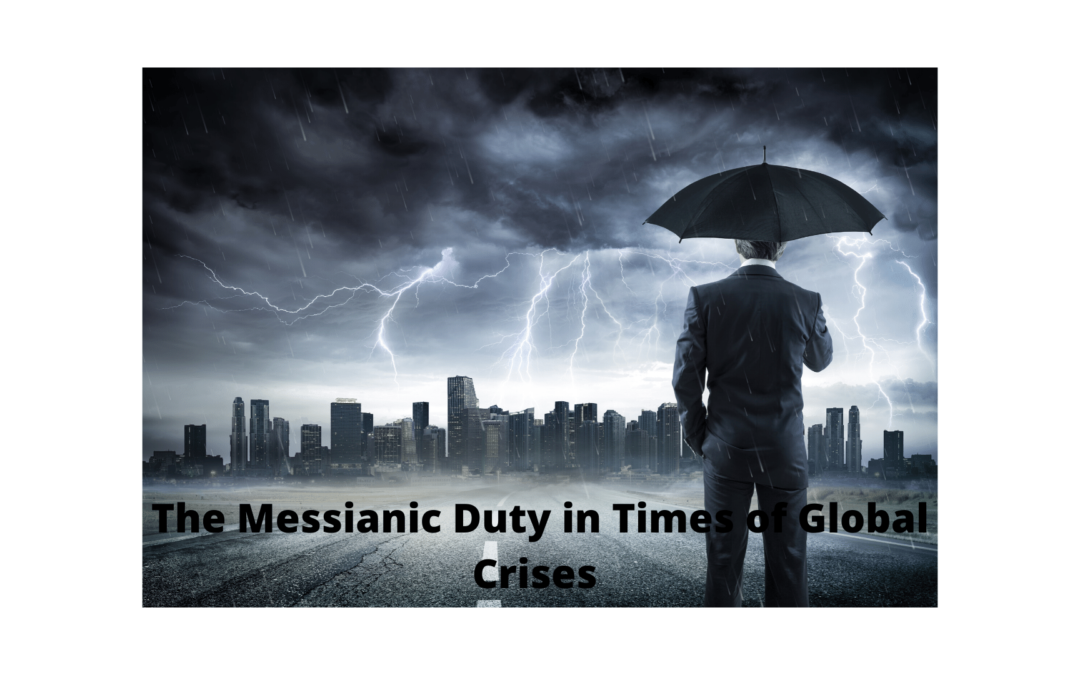
The Messianic Duty in Times of Global Crises
Given all the chaos and turmoil that is ongoing in the world today, I was led to talk to you today about duty. Specifically the Messianic duty in the midst of global chaos. Are we as Messianics required to put our two-cents towards fixing the clobal crises that are...
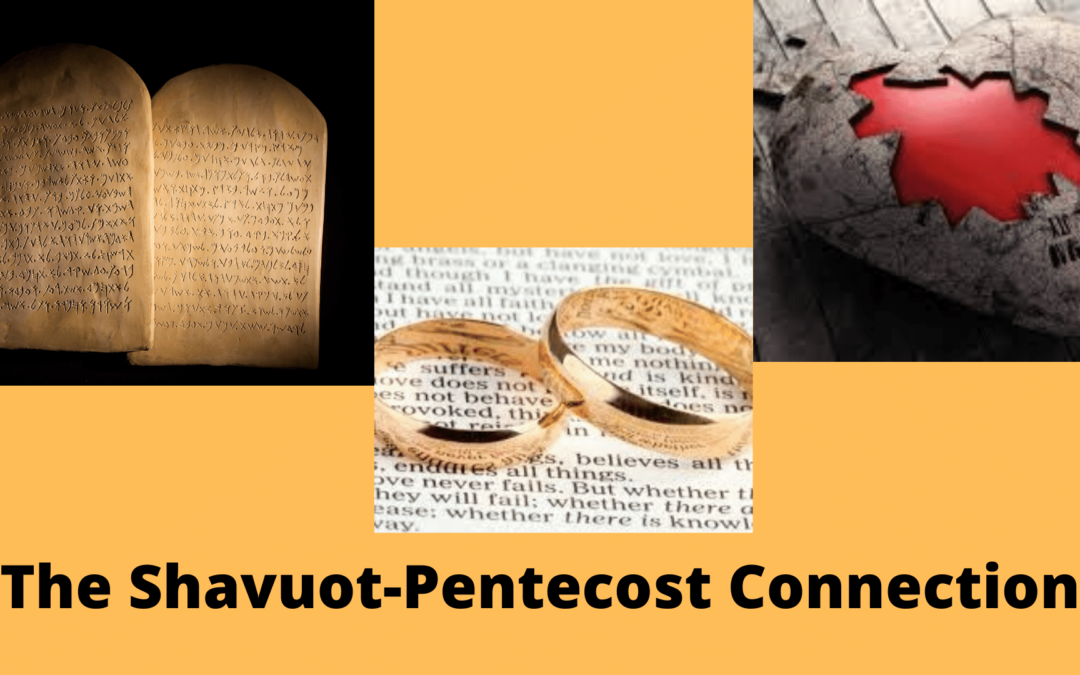
The Shavuot-Pentecost Connection
Two-Competing Schools of Thought Regarding Shavuot and Pentecost When we talk about Shavuot and or Pentecost there are essentially two-prevailing schools of thought and understanding. Interestingly, these two schools or lines of thought are often at odds with one...
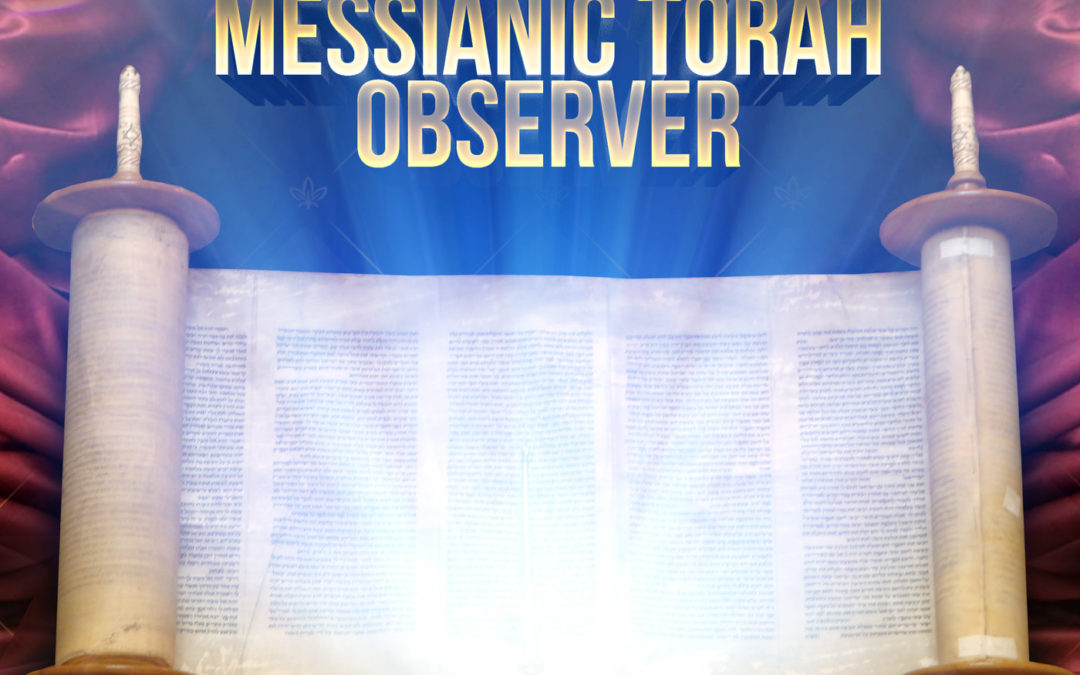
Shavuot 2020-When is It? How Did We Arrive at the Date? Do We Still Keep It ?
Explanation for this post As I record and post this installment of TMTO we are on the 4th day of the 3rd Month of the Creator's Calendar Year according to the observational calendar and the 5th day of the Month Sivan according to the Hillel's calculated...
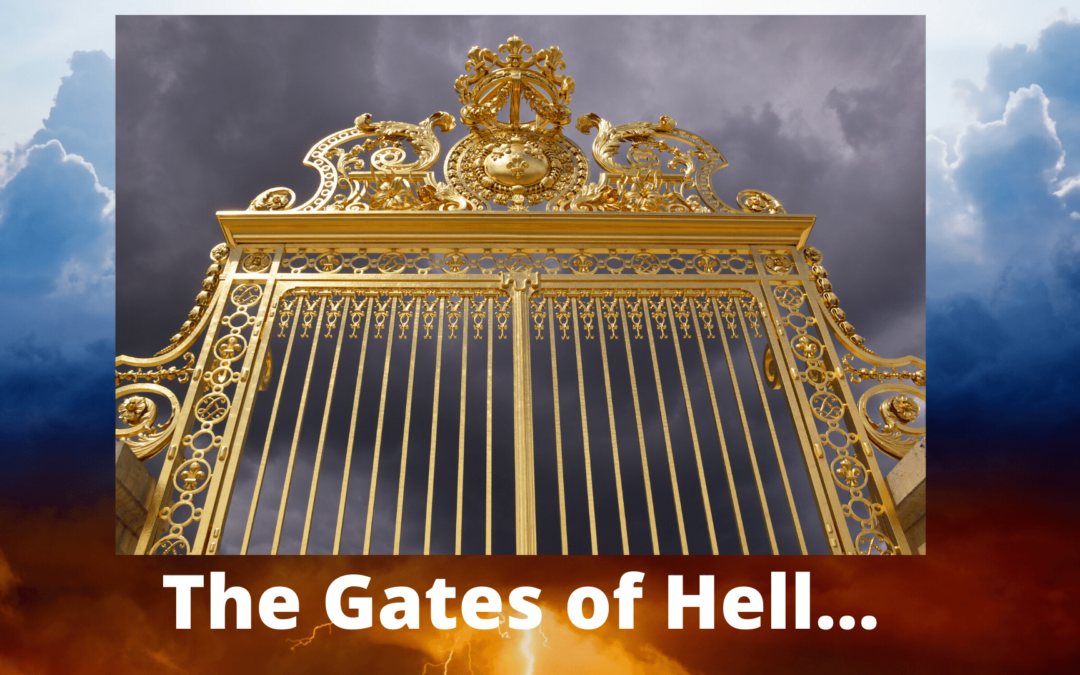
The Gates of Hell
The Gates of Hell Today I want to discuss the enemy’s goal to destroy and hinder the Creator's Plan of Redemption, Restoration and Salvation. It will become the purpose of this discussion to examine how the enemy was defeated by Master Yahoshua (Yeshua) Messiah and to...

